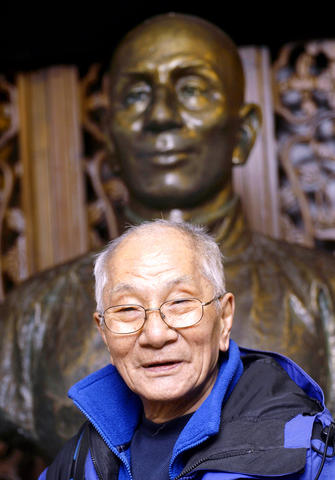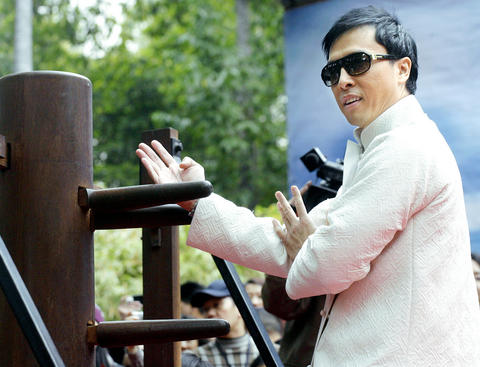Bruce Lee (李小龍) is the master to many martial arts fans. Less is known about his master, Ip Man (葉問), a pioneer in the kung fu style that influenced Lee. Hong Kong filmmakers hope to change that by bringing Ip's story to the big screen.
On Tuesday, action stars Donnie Yen (甄子丹) and Sammo Hung (洪金寶) from the US television series Martial Law prepared to start shooting one of two planned movies about Ip, as they joined Ip's sons in paying tribute to their father at his hometown in the southern Chinese city of Foshan, about four hours northwest of Hong Kong by car.
Performers staged a traditional Chinese lion dance featuring four bright orange lions on an outdoor platform near a memorial hall that honors Ip.

PHOTO: AP
Yen posed next to bust of Ip and performed a series of maneuvers against a wooden mannequin - a common practice in kung fu's wing chun style, which is known for its practicality.
Yen, a veteran action star whose credits include Blade 2, Hero (英雄) and Shanghai Knights, called his role as Ip his most challenging ever.
"We all know that teacher Ip Man promoted Chinese kung fu around the world. He's also the teacher of my idol Bruce Lee. So when I took this role I put a lot of pressure on myself," he said.

PHOTO :AP
Yen said he was focusing exclusively on his portrayal of Ip and leaving the action choreography to Hung, another kung fu movie veteran.
He said he has studied the wing chun style for a few months, but struck a humble tone. "I've learned a superficial few things. I don't dare say I know wing chun," he said. "But I hope to use my filmmaking experience and my few years of kung fu training to let more people know about teacher Ip Man and wing chun (詠春) through this movie." Yen's reverence for Ip's legacy is testimony to the master's storied reputation.
Born in Foshan in 1893, Ip started his training in wing chun - which traces its roots to a monk from the famed Shaolin Temple - in 1903, according to Ip's younger son, Ip Ching.
The elder Ip arrived in Hong Kong in the 1940s to escape the Communist takeover of China. In Hong Kong, he started out teaching kung fu to restaurant workers but broadened his reach to hundreds of students, including Lee, before passing away in 1972.
His sons studied under him and also taught. Their students have spread wing chun to the US, Canada, Australia, Britain and South Africa.
But Lee is a standout because of his international fame.
Lee, who died in 1973 at age 32 from swelling of the brain, studied under Ip for five years starting at age 13, according to his official biography on the Bruce Lee Foundation Web site.
"He greatly revered Ip Man as a master teacher and wise man and frequently visited with him in later years," the biography says.
Ip Chun, the older of Ip Man's two sons, said his father got along well with Lee.
"They had a very good relationship. They often studied kung fu together," the 84-year-old said, adding that Lee stayed in touch after studying with Ip. "I saw him very often."
The movie starring Yen isn't the only production about Ip Man in the works.
Famed Hong Kong art-house director Wong Kar-wai (王家衛) is also planning a biopic starring Cannes best actor winner Tony Leung Chiu-wai (梁朝偉), although the timetable for that project is unclear.
Wong's Jettone Films has not released any information about the movie, but Leung said this week he planned to devote the second half of this year to studying wing chun and hoped to start shooting at the end of the year or the beginning of next year.
Yen's movie, a US$5 million production directed by Wilson Yip (葉偉信), is scheduled to start shooting in March in Shanghai and to be released early next year, Yip said Tuesday.
Ip Chun said he would support both productions.
Yip said his movie would focus on Ip Man's time on the mainland and his tensions with China's Japanese invaders in the World War II era.

Even by the standards of Ukraine’s International Legion, which comprises volunteers from over 55 countries, Han has an unusual backstory. Born in Taichung, he grew up in Costa Rica — then one of Taiwan’s diplomatic allies — where a relative worked for the embassy. After attending an American international high school in San Jose, Costa Rica’s capital, Han — who prefers to use only his given name for OPSEC (operations security) reasons — moved to the US in his teens. He attended Penn State University before returning to Taiwan to work in the semiconductor industry in Kaohsiung, where he

On May 2, Chinese Nationalist Party (KMT) Chairman Eric Chu (朱立倫), at a meeting in support of Taipei city councilors at party headquarters, compared President William Lai (賴清德) to Hitler. Chu claimed that unlike any other democracy worldwide in history, no other leader was rooting out opposing parties like Lai and the Democratic Progressive Party (DPP). That his statements are wildly inaccurate was not the point. It was a rallying cry, not a history lesson. This was intentional to provoke the international diplomatic community into a response, which was promptly provided. Both the German and Israeli offices issued statements on Facebook

May 18 to May 24 Pastor Yang Hsu’s (楊煦) congregation was shocked upon seeing the land he chose to build his orphanage. It was surrounded by mountains on three sides, and the only way to access it was to cross a river by foot. The soil was poor due to runoff, and large rocks strewn across the plot prevented much from growing. In addition, there was no running water or electricity. But it was all Yang could afford. He and his Indigenous Atayal wife Lin Feng-ying (林鳳英) had already been caring for 24 orphans in their home, and they were in

Australia’s ABC last week published a piece on the recall campaign. The article emphasized the divisions in Taiwanese society and blamed the recall for worsening them. It quotes a supporter of the Taiwan People’s Party (TPP) as saying “I’m 43 years old, born and raised here, and I’ve never seen the country this divided in my entire life.” Apparently, as an adult, she slept through the post-election violence in 2000 and 2004 by the Chinese Nationalist Party (KMT), the veiled coup threats by the military when Chen Shui-bian (陳水扁) became president, the 2006 Red Shirt protests against him ginned up by